



Airport lights are used to illuminate airport runway at night or in low visibility conditions. Airport lighting helps pilots to identify runway, takeoff and touchdown areas, and other areas and obstructions on the airfield. Airport lighting includes approach lighting systems, runway & taxiway lighting, illuminated guidance signs, illuminated wind cones, and a few other types of lights described in this article.
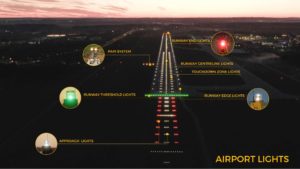
Check S4GA Solar Airfield Lighting Solution for AirportsRead more
At night, the airport is illuminated with different colour lights. The colour of airport light depends on its lighting unit function and is predefined by international aviation regulations (ICAO, Annex 14, Vol I, Chromaticity). For example, runway edges are illuminated with white lights in most cases. Yellow and red lights can be added. The types and colours of runway lights are explained in more detail in this article.
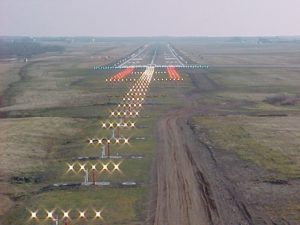
Approach Lights. Image source: hmiduluth.com
An approach lighting system is a set of lights that helps pilots to indicate the approach of the runway. We can include here PAPI lights, approach lights, and runway end identifier lights.
Approach lights are installed on the approach of the airport runway. There are different types of approach lights depending on the category of the runway and type of ALS (Approach Lighting System). The purpose of the ALS system is to help the pilot to identify the location of the runway in low visibility conditions. Approach lights are white or red in colour, with steady or flashing.
S4GA offers solar approach lights applicable for SALS (Simple Approach Lighting System). For international airports, there are backup portable approach lights available in S4GA.
PAPI (or Precision Approach Path Indicators) are white-red lights that identify glide paths. PAPI light consists of four projectors that change colour from white to red depending on the angle the pilot sees the lights. If all four projectors are red it means that pilot is too low. If all projectors are white it means the pilot is too high. The correct glide path is when two lights are red, and two lights are white.
Some airports install A-PAPI lights. A-PAPI light has the same logic of colour output; the difference is the number of projectors – A-PAPI has two of them (not fours).
S4GA offers a few types of PAPI lights: solar PAPI for permanent RWY illumination, portable halogen PAPI lights, and portable LED PAPI lights. S4GA solar PAPI is powered by a solar engine. A solar engine consists of a solar panel and a large power bank.
S4GA offers LED and halogen PAPI lights powered by a solar engine. Solar PAPI is autonomous and does not require any electrical network to operateRead more
Threshold lights (or wing bar lights) are green steady unidirectional runway lights that illuminate the runway thresholds. Threshold lights indicate the beginning of the ‘safe-to-land’ part of the runway. There are different types of threshold lights currently available on the market: inset or elevated, halogen or LED. However, all of them should be compliant with aviation norms in terms of photometric (light output) and chromaticity (colour). S4GA offers solar-powered LED elevated threshold lights certified and compliant with ICAO.
The runway end identifier light (short REIL) is a white flashing light that identifies the runway threshold. Another name is runway threshold identification light (or RTIL) defined by ICAO. The pair of REILs is usually installed on the left and right sides of the runway threshold. They serve as an additional identification of runway thresholds. S4GA offers solar REIL and portable REIL lighting fixtures.
Runway edge light is a white steady airfield light which is used to illuminate runway edges. Runway edge lights are one of the most important lights in any airfield lighting system. That’s why they are the brightest lights on the airfield. Runway edge lights are of white, yellow, and red colors. Yellow and red lights are located closer to the runway end.
ICAO defines low- and high-intensity runway edge lights. Low-intensity lights are used on non-precision runways; high intensity lights are required for CAT I, II, III runways. S4GA offers both types: SP-401 Solar Runway Edge Light (medium intensity) and SP-401 Solar HIRL.
Runway centerline lights are white colour steady inset lights located on the centre of a runway. They help pilots to keep the aeroplane in the central part when moving on the runway.
Runway end lights are red colour steady lights that indicate the end of the runway. For pilots, reaching red lights means that they cannot continue aircraft movement behind these lights. Usually, there is an additional paved area located behind red lights but it is used only for an emergency.
Very often airports choose combined type lights – runway threshold end lights with bidirectional red/green optics. They indicate runway threshold with green colour from one side and runway end with red colour from another side.
S4GA solar runway threshold end lights have been installed on a military airbase in Africa. S4GA system is used as a primary RWY illumination on a current airbaseRead Case Study
A runway guard light is used at the intersection between the runway and the taxiway. The unit consists of two lighting fittings, flashing yellow. Today, most airports are equipped with halogen runway guard lights. However, LED is becoming more and more popular due to its energy efficiency and high lifespan. S4GA offer solar-powered LED runway guard lights.
Contact S4GA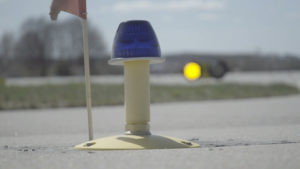
Elevated Taxiway Edge Light
Taxiway edge lights are blue colour airfield lights that indicate the edges of the taxiways. The same types of lights are used to illuminate aprons. Taxiway lights are of elevated or inset type. For budget purposes, some airports use taxiway reflective markers instead of lights. Taxiway markers are cheaper and do not require electricity.
S4GA offers LED elevated solar blue taxiway lights that do not require electricity to operate. S4GA lights are certified and compliant with ICAO norms.
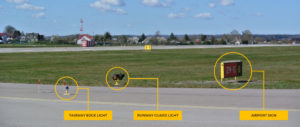
Taxiway centerline lights are yellow and green inset-type lights. They are usually installed on huge airport hubs with multiple taxiways and help pilots to run aircraft on the correct taxiway.
Airport Rotating Beacon. Image source: al.com
An airport beacon is a rotating lighting unit that is installed on a high mast at the airport and is aimed to indicate the airport location from the air. Airport beacons (or aerodrome beacons) are widely used in the US.
Obstruction lights are red colour steady lights used to illuminate different objects and obstacles on the airfield, runway unserviceable areas, and Airport Towers. There are different types of obstruction lights depending on the types of objects they illuminate. More about S4GA obstruction lights – here.
Contact S4GA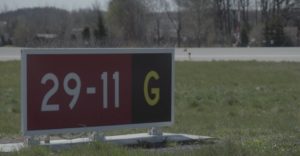
Airport Sign
Airport signs (or guidance signs, information signs) are signs containing numbers and letters that provide pilots with particular information about the airfield: length of the runway, runway category, runway direction, taxiway hold position etc.
Airport guidance signs are of different colours and sizes depending on the function they provide. For an additional visual indication of airport signs at night, they are illuminated with internal lighting.
S4GA Solar Runway Lighting has been installed at S. Darius and S. Girėnas Airport (or Aleksotas Airport) – a regional airport located in Kaunas, Lithuania. Solar AGL system was selected as a cost-effective solution alternative to wired runway lightingRead Case Study
S4GA delivered a portable runway lighting system in a trailer for Argentine Air Forces. The system includes complete set of portable runway lights with AGL Control & Monitoring System compliant with ICAO, FAA, NATO STANAG regulationsRead Case Study
SS-SR stands for sunset-sunrise. SS-SR airfield lights operate from dusk till dawn. They switch ON automatically in the evening, and switch OFF in the morning. S4GA solar and portable airfield lights operate in SS-SR mode.
Pilot-controlled airfield lighting can be activated from the air, using air-bank radio. S4GA offers UR-201 Control & Monitoring Unit allowing a remote activation and control of S4GA runway lights from the land, and the air (pilot-activated lighting).
With the UR-201 Unit, authorized airport personnel can activate runway lighting even from cell phone (GSM activation).
Pilot-activated lighting is widely used by domestic airports and general aviation airfields.
UR-201 Control & Monitoring Unit and Computer Interface are the key elements of S4GA ALCMS - Airfield Lighting Control And Monitoring SystemRead more
Solar airport lights are airfield lighting fixtures powered by solar energy. They become more and more popular among regional and even international airports. S4GA solar airfield lighting has been installed in Africa, Europe, Asia, and Latin America. Airports chose S4GA solar lights due to their advantages:
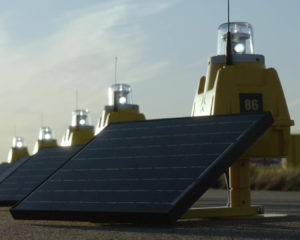
Contact us to get a quote or learn more about solar airfield lights.
Request S4GA Airport LightsS4GA solar airfield lighting has 5-level protection against system failure. By system failure, we mean a complete sudden loss of power supply to the airfield which causes limitation or stop of airport flight operations. Such a situation might happen due to different reasons such as power loss at a city power plant, fire in a substation, loss of CCRs (Constant Current Regulators), cable damage etc.
In solar airfield lighting, complete power loss is virtually impossible. The system is protected by five levels:
S4GA organises a series of free online webinars dedicated to solar airfield lighting. You can find S4GA webinars and other educational video content on S4GA Youtube Channel.
Contact S4GA